Kronos Quartet
"THE KRONOS QUARTET HAS BROKEN THE BOUNDARIES OF WHAT STRING QUARTETS DO."
– THE NEW YORK TIMES
For 50 years, San Francisco’s Kronos Quartet—David Harrington (violin), Gabriela Díaz (violin), Ayane Kozasa (viola), and Paul Wiancko (cello)—has challenged and reimagined what a string quartet can be. Founded at a time when the form was largely centered on long-established, Western European traditions, Kronos has been at the forefront of revolutionizing the string quartet into a living art form that responds to the people and issues of our time.

In the process, Kronos has become one of the most celebrated and influential groups of our era, performing thousands of concerts worldwide, releasing more than 70 recordings of extraordinary breadth and creativity, and collaborating with many of the world’s most accomplished composers and performers. Through its nonprofit organization, Kronos Performing Arts Association (KPAA), Kronos has commissioned more than 1,100 works and arrangements for string quartet—including the recently completed 50 for the Future library of free, educational repertoire. Kronos has received more than 40 awards, including three Grammy Awards and the Polar Music, Avery Fisher, and Edison Klassiek Oeuvre Prizes—among the most prestigious awards given to musicians. In 2024, the Library of Congress announced its acquisition of the Archive of Kronos Quartet/Kronos Performing Arts Association, a collection that includes 50 years’ worth of manuscripts, instruments, costumes, video and audio recordings, photographs, and more. Together, these materials constitute an invaluable record of Kronos/KPAA’s genesis, growth, and legacy, and will now be permanently housed in the Library’s Music Division alongside the storied histories of influential artists and composers from around the world.
Kronos’ adventurous approach dates back to the ensemble’s origins. In 1973, David Harrington formed the group after hearing George Crumb’s Black Angels, an innovative, Vietnam War–inspired work featuring bowed water glasses, spoken-word passages, and electronic effects. In addition to this formative work, Kronos began building its own eclectic repertoire for string quartet, performing and recording compositions by 20th-century masters (Sofia Gubaidulina, Astor Piazzolla, Alfred Schnittke), contemporary composers from around the world (Sahba Aminikia, Nicole Lizée, Vladimir Martynov, Aleksandra Vrebalov), jazz legends (Charles Mingus, Thelonious Monk, Maria Schneider), rock artists (Jimi Hendrix, Sigur Rós, Pete Townshend), and artists who defy genre (Laurie Anderson, Trevor Paglen, Tanya Tagaq).
Integral to Kronos’ work is a series of long-running, in-depth collaborations with many of the world’s foremost composers, resulting in a vast body of Kronos-commissioned works for string quartet. One of the quartet’s most long-standing and frequent collaborators is Terry Riley, whose work with Kronos includes Sunrise of the Planetary Dream Collector (1980), Salome Dances for Peace (1985–86), and Sun Rings (2002). Aleksandra Vrebalov has written more than 20 pieces for Kronos, including Pannonia Boundless (1998); …hold me, neighbor, in this storm… (2007); and Beyond Zero (2014), a multimedia meditation on World War I in collaboration with filmmaker Bill Morrison. The quartet has also collaborated extensively with Philip Glass, recording an album of his string quartets in 1995 and premiering String Quartets No. 6 (2013) and No. 7 (2014); with Franghiz Ali-Zadeh, whose works are featured on the full-length 2005 release Mugam Sayagi; and with Steve Reich, whose string quartets Different Trains (1989), Triple Quartet (2001), and WTC 9/11 (2011) were written for and recorded by Kronos.
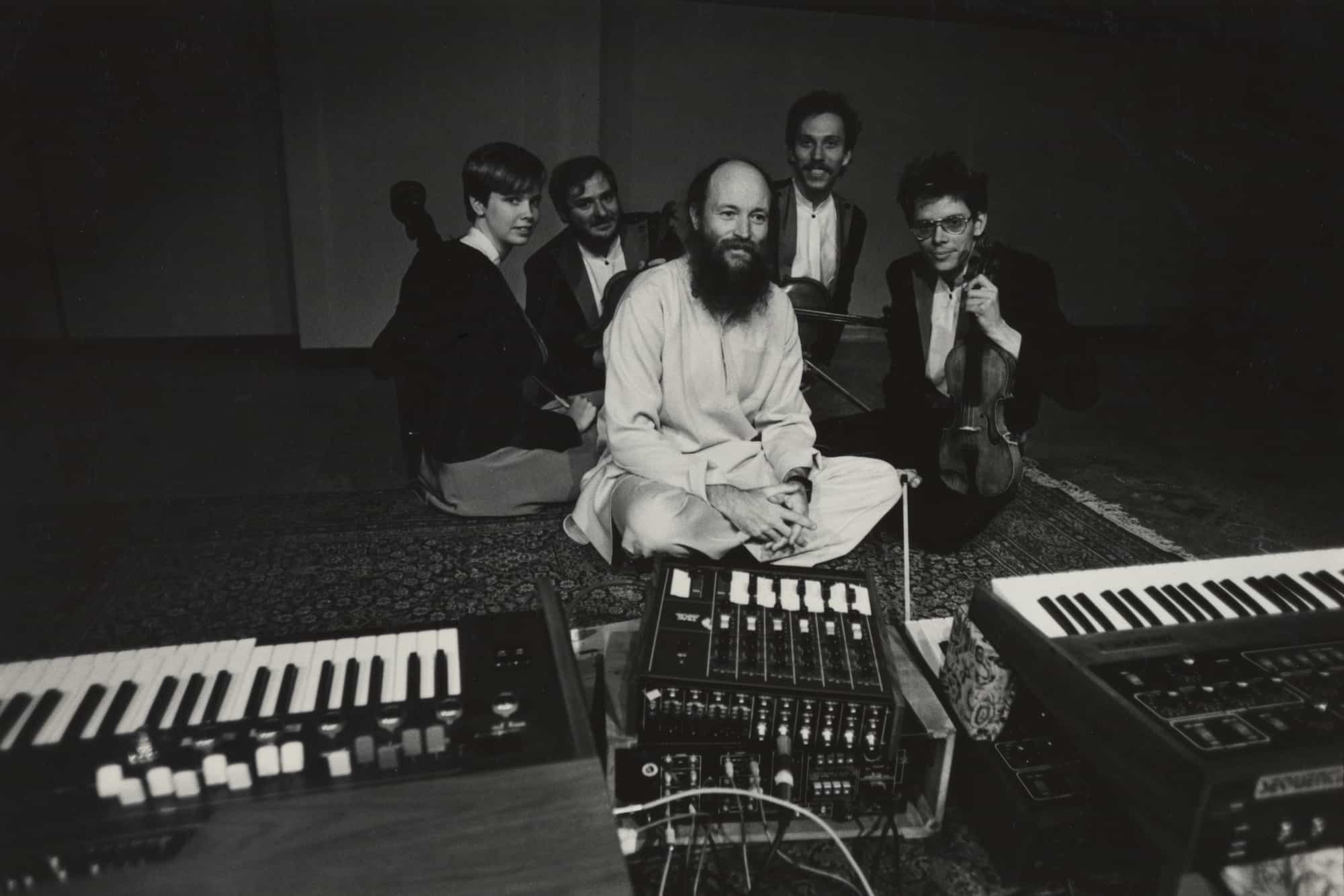
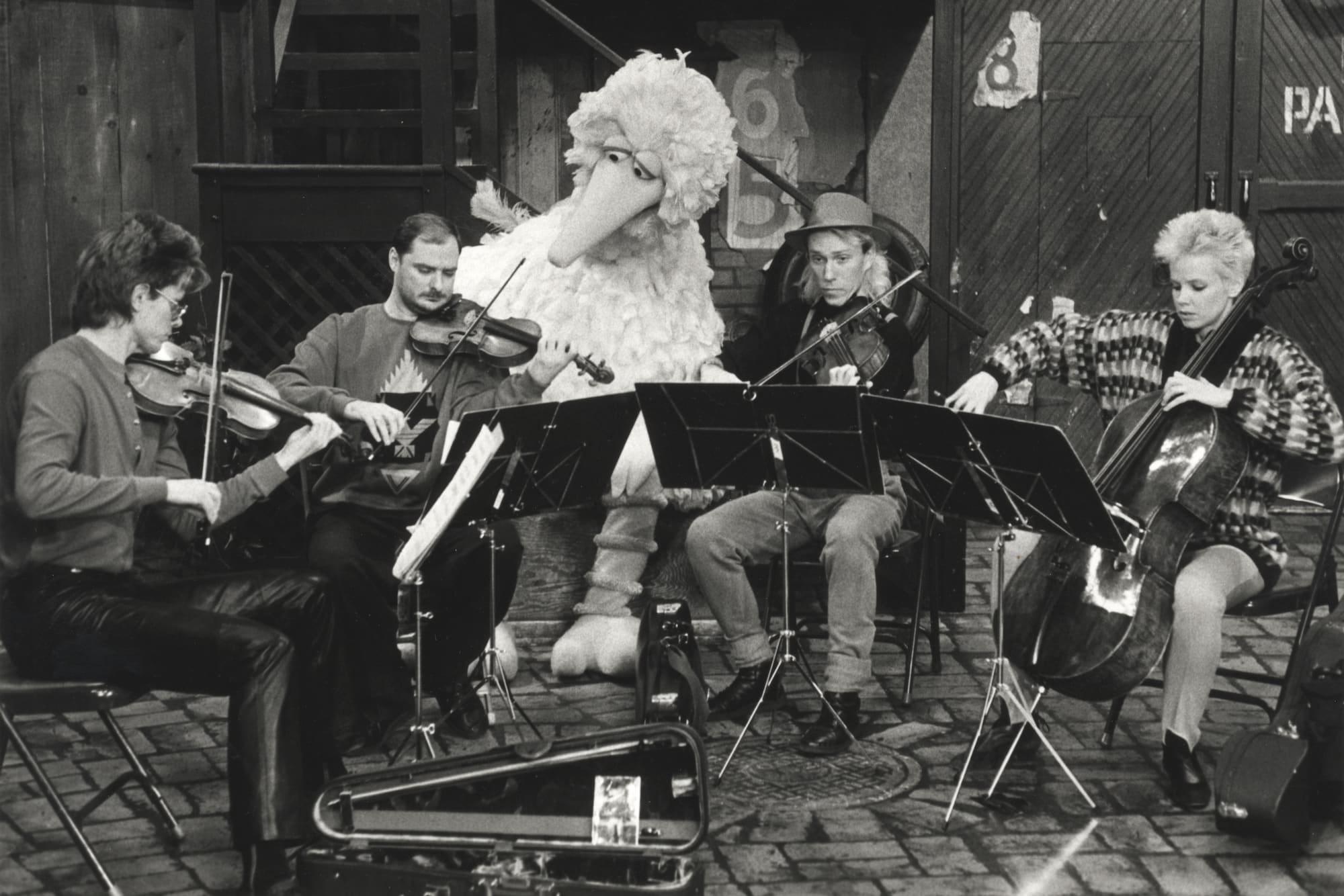
In its most ambitious commissioning effort to date, KPAA has recently completed a monumental education project that will be a cornerstone of Kronos’ ongoing legacy: Kronos Fifty for the Future. Through this initiative, Kronos has commissioned—and distributed online for free—50 new works for string quartet designed expressly for the training of students and professionals, written by composers from around the world. Scores and parts, recordings, and other materials are available on kronosquartet.org. Although the library of compositions is now complete, Kronos Fifty for the Future continues to grow, with tens of thousands of scores downloaded in more than 100 countries and territories around the globe. Lead partner Carnegie Hall and an adventurous group that includes presenters, academic institutions, foundations, and individuals have joined forces with Kronos to support this program.
In recordings, Kronos has collaborated with numerous artists from around the world, including Chinese pipa virtuoso Wu Man, a collaborator since the early 1990s; Indian tabla virtuoso Zakir Hussain; Azeri master vocalist Alim Qasimov; legendary Bollywood “playback singer” Asha Bhosle; punk legend Patti Smith; Romanian band Taraf de Haïdouks; Iranian vocalist Mahsa Vahdat; and Trio Da Kali, an ensemble of griot musicians from Mali. Kronos has performed live with the likes of Paul McCartney, David Bowie, Allen Ginsberg, Rokia Traoré, Tom Waits, Rhiannon Giddens, Howard Zinn, Betty Carter, Van Dyke Parks, Caetano Veloso, k.d. lang, and The National, and has appeared on recordings by artists such as Nine Inch Nails, Dan Zanes, Glenn Kotche, Dave Matthews Band, Joan Armatrading, Angélique Kidjo, and the San Francisco Girls Chorus. In dance, the famed choreographers Merce Cunningham, Paul Taylor, Twyla Tharp, Alonzo King, Eiko & Koma, and many others have created pieces set to Kronos’ music.
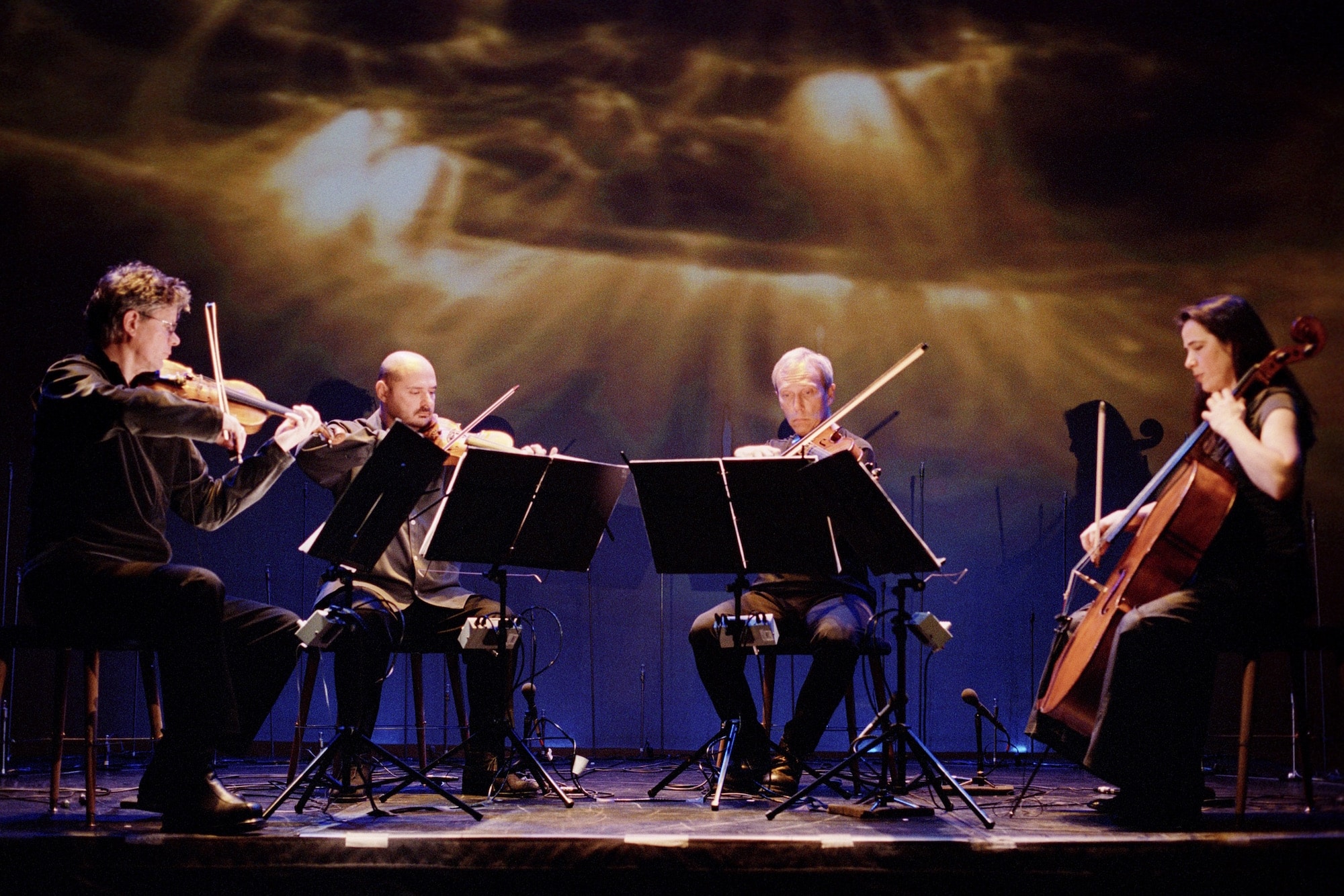
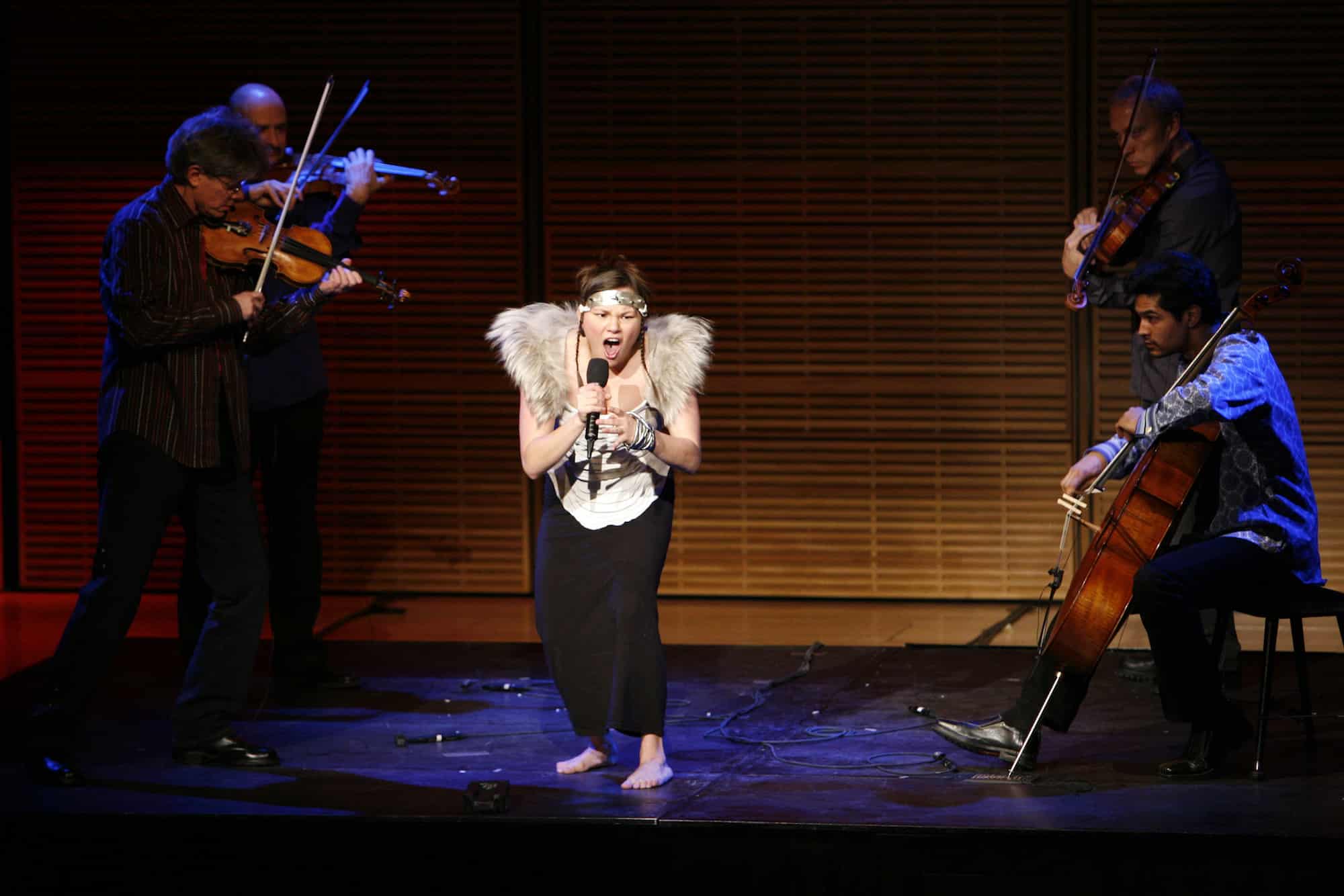
With its roots in the Vietnam War–inspired Black Angels, Kronos has spent five decades centering its work around the key issues of our time. Underscoring the idea that music should be in constant, evolving interaction with the world, Kronos has commissioned, performed, and recorded works that engage with topics such as war and destruction (Jonathan Berger and Harriet Scott Chessman’s Mỹ Lai; Mary Kouyoumdjian’s Bombs of Beirut and Silent Cranes; Mariana Sadovska’s Chernobyl.The Harvest; Aleksandra Vrebalov’s Beyond Zero), the climate crisis (Laurie Anderson’s Landfall); social injustice (Bob Ostertag’s All the Rage; Zachary James Watkins’ Peace Be Till; Michael Abels and Nikky Finney’s At War With Ourselves); and existence and spirituality (Terry Riley’s Sun Rings; Tan Dun’s Ghost Opera).
The quartet spends several months of each year on tour, appearing in concert halls, clubs, and festivals around the world, including Carnegie Hall, BRIC Celebrate Brooklyn!, and BAM Next Wave Festival in New York; Royce Hall at UCLA; Big Ears in Knoxville, Tennessee; Palacio de Bellas Artes in Mexico City; the Barbican in London; the Philharmonie de Paris; the Muziekgebouw in Amsterdam; Haydn Hall at Schloss Esterhazy, Austria; The Arts Center at New York University Abu Dhabi; Shanghai Concert Hall; Suntory Hall in Tokyo; and the Sydney Opera House.
Kronos is prolific and wide-ranging on recordings. The ensemble’s expansive discography on Nonesuch includes three Grammy-winning albums: Terry Riley’s Sun Rings (2019), Landfall with Laurie Anderson (2018), and Alban Berg’s Lyric Suite featuring soprano Dawn Upshaw (2003); collections like the boxed set One Earth, One People, One Love: Kronos Plays Terry Riley (2015); the 40th-anniversary boxed set Kronos Explorer Series and companion single-disc A Thousand Thoughts (both 2014); and Nuevo (2002), a Grammy- and Latin Grammy–nominated celebration of Mexican culture. Pieces of Africa (1992), Kronos’ showcase of African-born composers that simultaneously topped Billboard’s Classical and World Music charts, was one of just 25 recordings inducted into the 2024 National Recording Registry, where it joins other iconic recordings the Library of Congress has deemed “worthy of preservation for all time based on their cultural, historical, or aesthetic importance in the nation’s recorded sound heritage.” Kronos’ recent releases include Songs and Symphoniques: The Music of Moondog (2023), a collaboration between Kronos and the Ghost Train Orchestra revisiting Moondog’s vital and uplifting music for a new generation; Mỹ Lai (2022), an opera by Jonathan Berger (music) and Harriet Scott Chessman (libretto) featuring Kronos with Vietnamese multi-instrumentalist Vân-Ánh Vanessa Võ and vocalist Rinde Eckert; and Long Time Passing: Kronos & Friends Celebrate Pete Seeger (2020) with Sam Amidon, Maria Arnal, Brian Carpenter, Lee Knight, Meklit, and Aoife O’Donovan. Music publishers Boosey & Hawkes have released two volumes of Kronos Collection sheet music, featuring works by Terry Riley, Hamza el Din, Aleksandra Vrebalov, and Osvaldo Golijov.
Kronos’ work has featured prominently in a number of films, including A Thousand Thoughts, a unique multimedia piece that blends live music by Kronos and narration by Sam Green with archival footage and filmed interviews to create a “live documentary” that tells the story of Kronos’ expansive career. Written and directed by Green and Joe Bini, the work premiered at the Sundance Film Festival in 2018 and has since toured around the world. Most recently, the quartet performed on the soundtrack for Users (2021) and is both seen and heard in the documentary Zappa (2020). Kronos’ music has been featured in two Academy Award–nominated documentaries: Dirty Wars (2013)—for which Kronos’ David Harrington served as Music Supervisor—and How to Survive a Plague (2012). Kronos has also recorded complete film scores by Jacob Garchik for Guy Maddin’s The Green Fog (2017); Clint Mansell for Darren Aronofsky’s The Fountain (2006) and Requiem for a Dream (2000); and Philip Glass for Dracula (1999)—a restored edition of the 1931 Bela Lugosi classic.
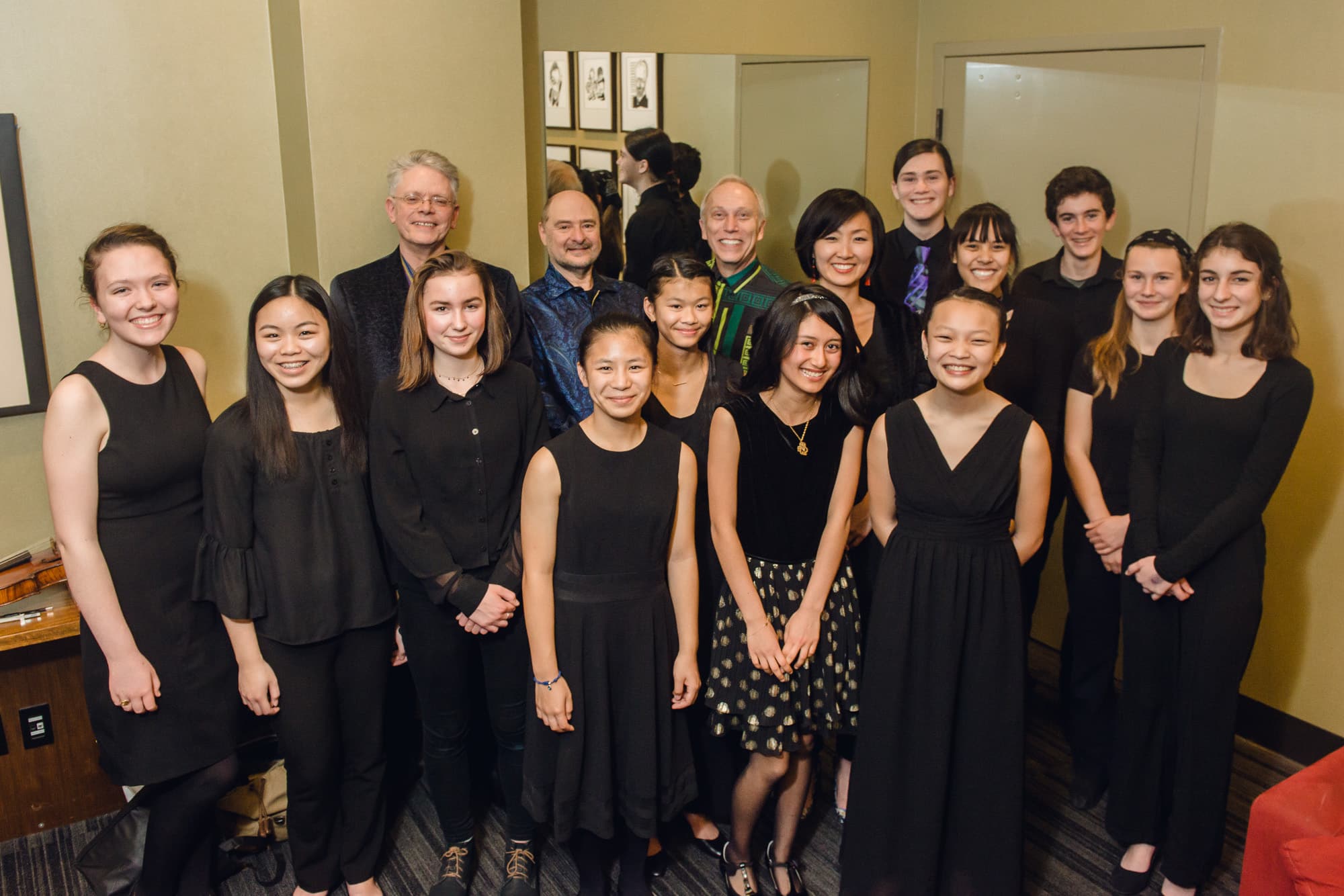
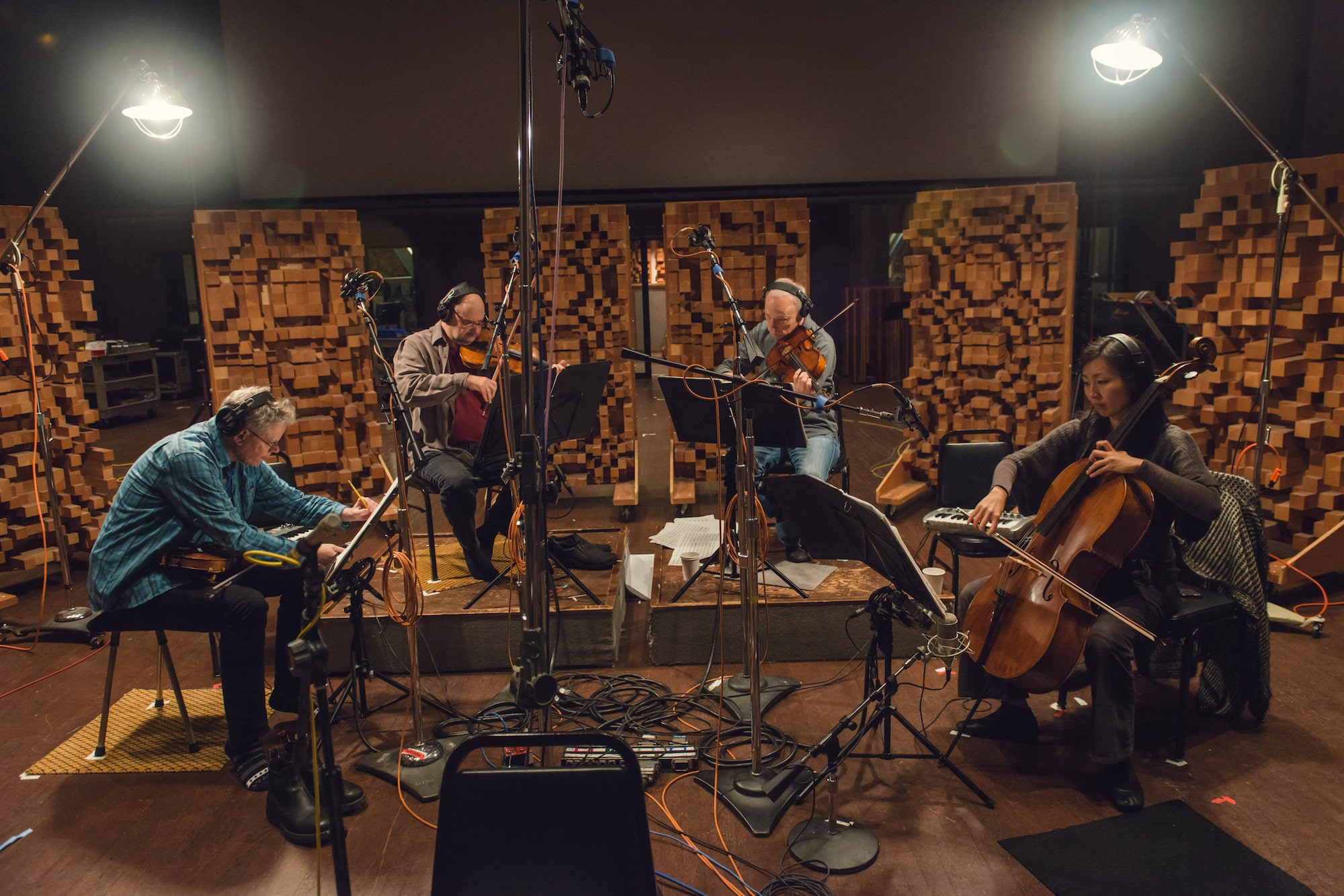
The quartet is committed to mentoring emerging performers and composers and has led workshops, master classes, and other education programs with Carnegie Hall’s Weill Music Institute (New York), Kaufman Music Center’s Face the Music (New York), Luna Composition Lab (New York), the Royal Conservatory of Music (Toronto), Ruth Asawa San Francisco School of the Arts, and San Francisco Conservatory of Music, among other institutions in the U.S. and abroad. Kronos has undertaken extended educational residencies at institutions such as Oakland School for the Arts, UC Berkeley’s Cal Performances, Holland Festival, The John J. Cali School of Music at Montclair State University, and New York University Abu Dhabi.
Based in San Francisco, the nonprofit KPAA staff manages all aspects of Kronos’ work, including commissioning, concert tours and local performances, recordings, education programs, and an annual self-produced Kronos Festival in San Francisco.
STAY UPDATED WITH KRONOS

your email:


